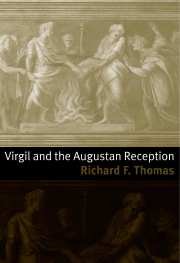Book contents
- Frontmatter
- Contents
- Acknowledgements
- Prologue
- Introduction: the critical landscape
- 1 Virgil and Augustus
- 2 Virgil and the poets: Horace, Ovid and Lucan
- 3 Other voices in Servius: schooldust of the ages
- 4 Dryden's Virgil and the politics of translation
- 5 Dido and her translators
- 6 Philology and textual cleansing
- 7 Virgil in a cold climate: fascist reception
- 8 Beyond the borders of Eboli: anti-fascist reception
- 9 Critical end games
- Bibliography
- Index
Prologue
Published online by Cambridge University Press: 07 December 2009
- Frontmatter
- Contents
- Acknowledgements
- Prologue
- Introduction: the critical landscape
- 1 Virgil and Augustus
- 2 Virgil and the poets: Horace, Ovid and Lucan
- 3 Other voices in Servius: schooldust of the ages
- 4 Dryden's Virgil and the politics of translation
- 5 Dido and her translators
- 6 Philology and textual cleansing
- 7 Virgil in a cold climate: fascist reception
- 8 Beyond the borders of Eboli: anti-fascist reception
- 9 Critical end games
- Bibliography
- Index
Summary
As one long convinced that much of the power and the beauty of Virgilian poetry lies in the profound qualifications of the poet's vision of the political and cultural worlds that his poetry engages, I used to be uncomfortable with the possibility that this view was somehow related to my opposition to the involvement of my country (New Zealand at that point) in an illegal and unjust war in Vietnam. Indeed, as a good classicist, I even felt a little guilty as I read such comments as “the damage suffered by the interpretation of Roman poetry has consisted largely of the Vietnam war being imposed on the wars of Aeneas in Italy.” One scholar even responded to some offprints I sent with the admonition that “it don't help to use the sort of language that goes back to the worst years of Vietnam or the Spanish civil war.” But since my convictions about the darkness of Virgil's vision, far from abating, only developed as I read, taught and wrote about this author, and since I continued to be unhappy with the proposition that these views were just the product of my days as a Vietnam war protester, which were after all becoming somewhat remote, I decided to go looking for my Virgil elsewhere in the Virgil tradition, hoping that he might have flourished also in other ages. I found him here and there, but, more importantly, I found him being suppressed and avoided, replaced by something else, and transformed into what I will be calling the “Augustan Virgil.” E. L. Edmunds, in a review of C. Martindale, notes that “the hermeneutic approach to a text must begin with one's own horizon.
- Type
- Chapter
- Information
- Virgil and the Augustan Reception , pp. xi - xxPublisher: Cambridge University PressPrint publication year: 2001

